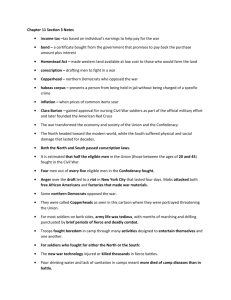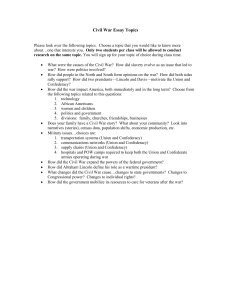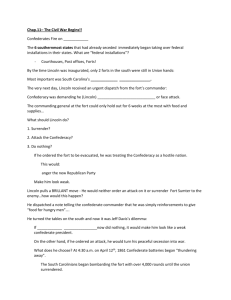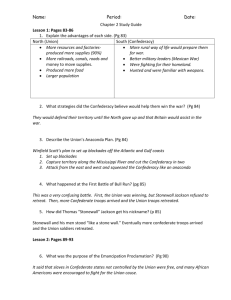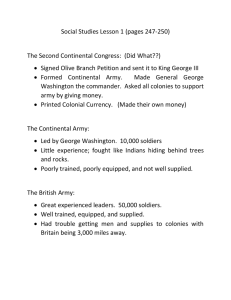Advantages of the North and South
advertisement
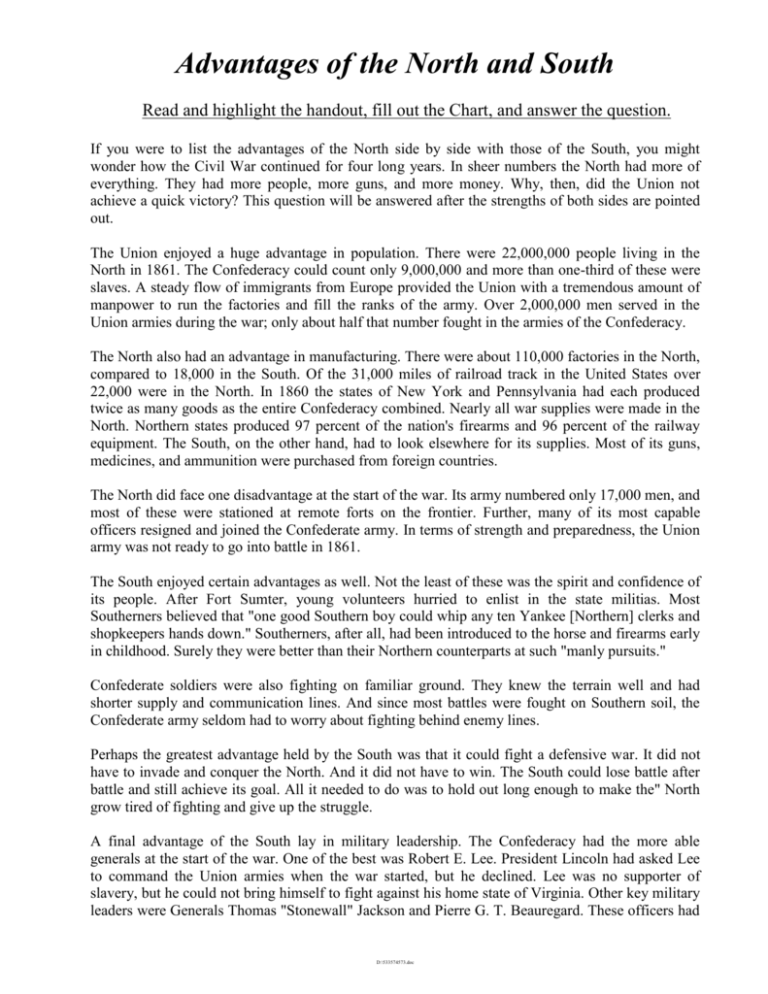
Advantages of the North and South Read and highlight the handout, fill out the Chart, and answer the question. If you were to list the advantages of the North side by side with those of the South, you might wonder how the Civil War continued for four long years. In sheer numbers the North had more of everything. They had more people, more guns, and more money. Why, then, did the Union not achieve a quick victory? This question will be answered after the strengths of both sides are pointed out. The Union enjoyed a huge advantage in population. There were 22,000,000 people living in the North in 1861. The Confederacy could count only 9,000,000 and more than one-third of these were slaves. A steady flow of immigrants from Europe provided the Union with a tremendous amount of manpower to run the factories and fill the ranks of the army. Over 2,000,000 men served in the Union armies during the war; only about half that number fought in the armies of the Confederacy. The North also had an advantage in manufacturing. There were about 110,000 factories in the North, compared to 18,000 in the South. Of the 31,000 miles of railroad track in the United States over 22,000 were in the North. In 1860 the states of New York and Pennsylvania had each produced twice as many goods as the entire Confederacy combined. Nearly all war supplies were made in the North. Northern states produced 97 percent of the nation's firearms and 96 percent of the railway equipment. The South, on the other hand, had to look elsewhere for its supplies. Most of its guns, medicines, and ammunition were purchased from foreign countries. The North did face one disadvantage at the start of the war. Its army numbered only 17,000 men, and most of these were stationed at remote forts on the frontier. Further, many of its most capable officers resigned and joined the Confederate army. In terms of strength and preparedness, the Union army was not ready to go into battle in 1861. The South enjoyed certain advantages as well. Not the least of these was the spirit and confidence of its people. After Fort Sumter, young volunteers hurried to enlist in the state militias. Most Southerners believed that "one good Southern boy could whip any ten Yankee [Northern] clerks and shopkeepers hands down." Southerners, after all, had been introduced to the horse and firearms early in childhood. Surely they were better than their Northern counterparts at such "manly pursuits." Confederate soldiers were also fighting on familiar ground. They knew the terrain well and had shorter supply and communication lines. And since most battles were fought on Southern soil, the Confederate army seldom had to worry about fighting behind enemy lines. Perhaps the greatest advantage held by the South was that it could fight a defensive war. It did not have to invade and conquer the North. And it did not have to win. The South could lose battle after battle and still achieve its goal. All it needed to do was to hold out long enough to make the" North grow tired of fighting and give up the struggle. A final advantage of the South lay in military leadership. The Confederacy had the more able generals at the start of the war. One of the best was Robert E. Lee. President Lincoln had asked Lee to command the Union armies when the war started, but he declined. Lee was no supporter of slavery, but he could not bring himself to fight against his home state of Virginia. Other key military leaders were Generals Thomas "Stonewall" Jackson and Pierre G. T. Beauregard. These officers had D:\533574573.doc graduated from the United States Military Academy in West Point, New York. They knew well how to command troops. But it is obvious, from the standpoint of manpower and industrial strength, that the advantages of the North far outweighed those of the South. Why then did the war last so long? Several reasons explain the duration of the conflict. First, neither side was prepared to carry on a full-scale war. Not only was the small Union army scattered throughout the West, but its navy was assigned to different places around the world. Of fifty-three active ships in 1861, eleven were captured by the Confederacy after Fort Sumter. That left only forty-two ships to blockade the South in hopes of preventing needed supplies from coming in. Forty-two (42) ships were not enough to carry out the task. The South was in even worse shape. It had no regular army, as did the North. Each state had a small militia made up largely of farmers. Although Confederate President Jefferson Davis's call for 100,000 volunteers was enthusiastically answered, these volunteers were raw recruits. They needed to be trained and disciplined to become soldiers. Training inexperienced troops takes time. Like Jefferson Davis in the South, President Lincoln also asked for volunteers to fill the Union army. Since men did not volunteer fast enough, the government offered a bounty (gift of money) to all who would agree to join. Some dishonest enlistees took advantage of the situation and became bounty jumpers. Thus meant they would enlist in one town, collect their money, and then run away to another town and enlist there, again collecting their bounty. They continued moving from place to place until some grew quite rich. Both the Union and the Confederacy eventually resorted to the draft. The South began to draft all men between the ages of eighteen and thirty-five in 1862. One year later, the North started calling up anyone between twenty and forty-five. Both sides offered a way out of service. A Southerner who owned twenty or more slaves did not have to fight. Others were able to pay a substitute to take their place. A Northerner with $300 also could pay a fee and be excused. Because men with money could buy their way out fighting, some people referred to the war as a "rich man's war and a poor man's fight." A second reason why the Civil War lasted so long had to do with the seasons. In general, the opposing armies did little fighting in the winter months) when cold weather and mud made the movement of guns and wagons difficult. Therefore, while the war lasted four years, actual fighting took place only during a portion of each of those years. A final reason for the length of the war concerned the number of soldiers required by the Union armies. Because the South was fighting a defensive war, it could make do with far fewer troops. But the North needed soldiers to guard and hold every important place it conquered. It also needed soldiers to care for and feed thousands of freed or runaway slaves who came under its protection. Therefore, the North's tremendous advantage in numbers was offset somewhat by the manner in which it had to use many of its troops. D:\533574573.doc Who were these troops who filled the ranks of both armies? They came from all walks of life and all kinds of families. Often families were divided in their allegiance to one side or the other. Even the powerful were not spared the agony of seeing some members fight for the North and others for the South. President Lincoln's wife, Mary Todd Lincoln, had three brothers - and a brother-in-law who were officers in the Confederate Army. Thus, the President himself had four brothers-in-law who fought for the South. It was especially painful for families who lived in the Border States. The Border States were the states situated between the two sections of the country. There were eight: Virginia, Tennessee, North Carolina, Arkansas, Delaware, Missouri, Kentucky, and Maryland. Virginia, Tennessee, North Carolina, and Arkansas joined the Confederacy. Delaware, Missouri, Kentucky, and Maryland remained loyal to the Union. West Virginia broke away from Virginia in 1863 and also sided with the North. In the Border States, families were split apart by the war. One brother might enlist to fight for the North and another for the South. Cousin fought against cousin and uncle against nephew. And in both Northern and Southern states there were men who marched off to fight the other side. Some soldiers fought for both. They would become disillusioned with one army and end up fighting for the other. What a strange war! The war was even stranger considering the number of boys who participated. Many were as young as eight or nine. 1. On your study guide, list the reasons why the war lasted so long. D:\533574573.doc Background Information on the Eve of the Civil War Category Other Names North South Flag # States Population Free Slave Free Slave Industry Railroad Mileage Financial Resources Leadership Generals D:\533574573.doc
